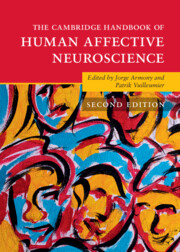Book contents
- The Cambridge Handbook of Human Affective Neuroscience
- Cambridge Handbooks in Psychology
- The Cambridge Handbook of Human Affective Neuroscience
- Copyright page
- Contents
- Figures
- Tables
- Contributors
- Introduction
- Section I Theoretical Models of Emotion
- Section II Measuring Emotional Processes
- Section III Emotion Perception and Elicitation
- Section IV Emotional Learning and Memory
- Section V Cognition–Emotion Interactions
- Section VI Social Emotions
- Section VII Individual Differences
- Index
Introduction
Published online by Cambridge University Press: 16 September 2025
- The Cambridge Handbook of Human Affective Neuroscience
- Cambridge Handbooks in Psychology
- The Cambridge Handbook of Human Affective Neuroscience
- Copyright page
- Contents
- Figures
- Tables
- Contributors
- Introduction
- Section I Theoretical Models of Emotion
- Section II Measuring Emotional Processes
- Section III Emotion Perception and Elicitation
- Section IV Emotional Learning and Memory
- Section V Cognition–Emotion Interactions
- Section VI Social Emotions
- Section VII Individual Differences
- Index
Summary
Human affective science has advanced rapidly over the past decades, emerging as a central topic in the study of the mind. This handbook provides a comprehensive and authoritative road map to the field, encompassing the most important topics and methods. It covers key issues related to basic processes including perception of, and memory for, different types of emotional information, as well as how these are influenced by individual, social, and cultural factors. Methods such as functional neuroimaging are also covered. Evidence from clinical studies of brain disease such as anxiety and mood disorders shed new light on the functioning of emotion in all brains. In covering a dynamic and multifaceted field of study, this book will appeal to students and researchers in neuroscience, psychology, psychiatry, biology, medicine, education, social sciences, and philosophy.
Information
- Type
- Chapter
- Information
- Publisher: Cambridge University PressPrint publication year: 2025
Accessibility standard: WCAG 2.0 A
Content Navigation
Allows you to navigate directly to chapters, sections, or non‐text items through a linked table of contents, reducing the need for extensive scrolling.
Provides an interactive index, letting you go straight to where a term or subject appears in the text without manual searching.
Reading Order & Textual Equivalents
You will encounter all content (including footnotes, captions, etc.) in a clear, sequential flow, making it easier to follow with assistive tools like screen readers.
You get concise descriptions (for images, charts, or media clips), ensuring you do not miss crucial information when visual or audio elements are not accessible.
You get more than just short alt text: you have comprehensive text equivalents, transcripts, captions, or audio descriptions for substantial non‐text content, which is especially helpful for complex visuals or multimedia.
Visual Accessibility
You benefit from high‐contrast text, which improves legibility if you have low vision or if you are reading in less‐than‐ideal lighting conditions.
Structural and Technical Features
You gain clarity from ARIA (Accessible Rich Internet Applications) roles and attributes, as they help assistive technologies interpret how each part of the content functions.
